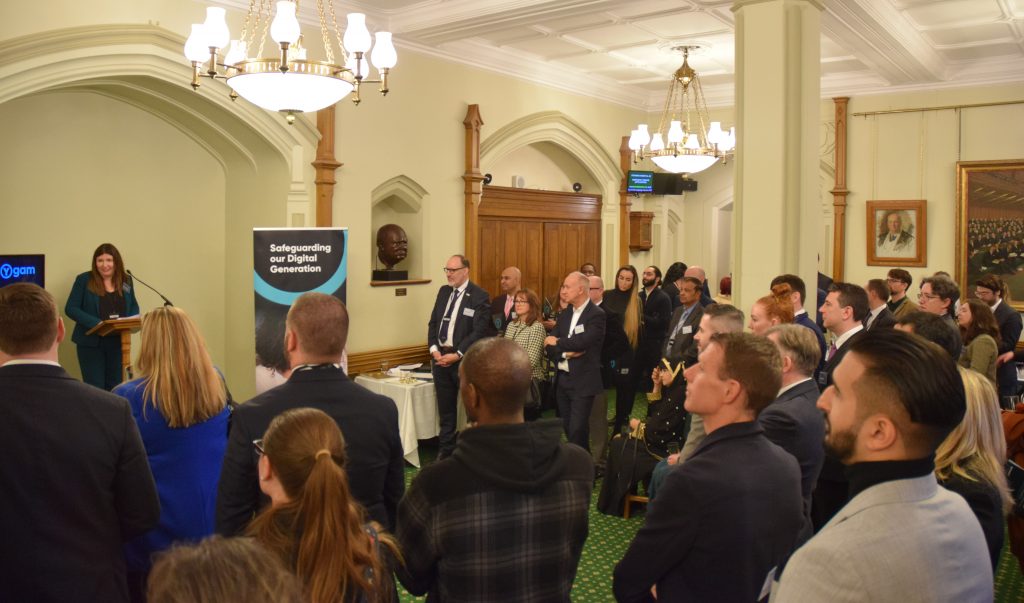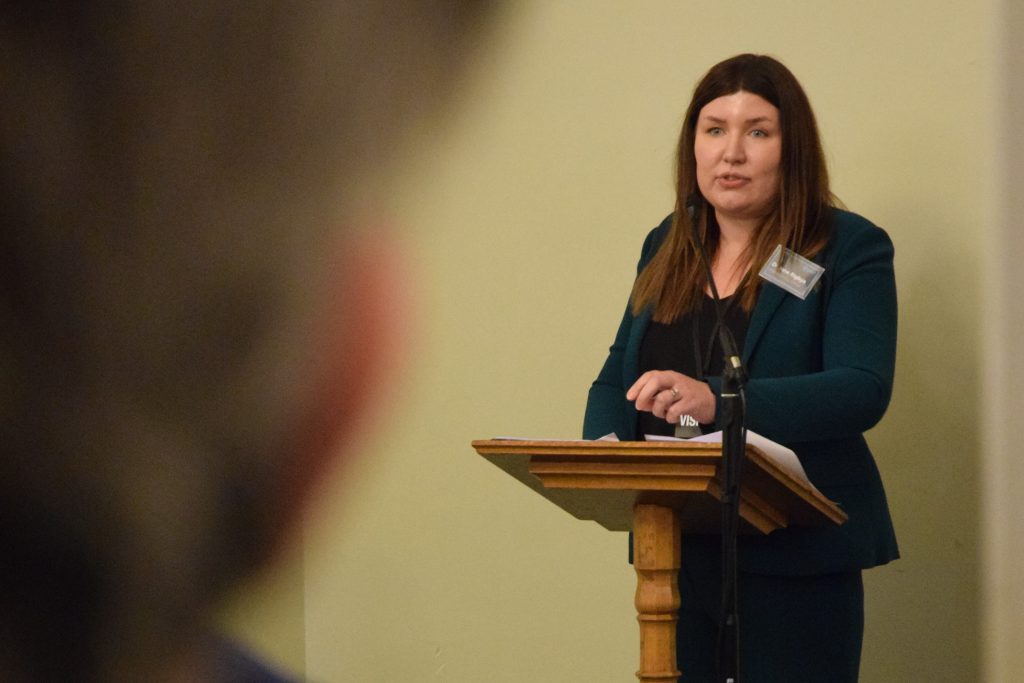Dr Jane Rigbye, Ygam CEO, delivered this speech on 17 January 2023 at a parliamentary reception for the launch of the charity’s new strategy.
Thank you to everyone in the room for coming to support us this afternoon, and to hear more about our new strategy. I am delighted to be speaking to you. Today is coincidentally exactly one year since I joined the team, and what a year we’ve had.
It won’t have gone unnoticed that we look a little different. With a new strategic focus, we felt it was time for a refreshed brand that speaks more to the work we do and the youth-focused, digital space we now occupy.
We are launching this strategy in a time of uncertainty – and if you thought I was going to refer to the elusive White Paper and all of the uncertainty that surrounds that, you’re wrong – well, not just yet!
The future for many young people is uncertain.
Recent years have brought significant challenges to families still feeling the ripple effects of the impact of the pandemic. Young people have faced disruption to their education and their social development, and this disruption is likely to continue to affect their mental and physical health as they enter adulthood. Families are being further impacted by the increased cost of living, no doubt most significantly affecting those who feel the greatest burden due to inequalities in our society. Public services are stretched.
Therefore, the prevention of future harm is more important now than ever.
The digital world offers huge opportunities, most visible during the pandemic when most UK families found digital technology an essential part of remaining connected, and we found new ways of working, communicating and collaborating. But with those opportunities come risks, particularly for young people who live in an increasingly digitised world.
At Ygam, our mission is clear: to prevent children and young people from experiencing gaming and gambling harms through awareness raising, education and research. Prevention of these harms may not always be at the top of the pile of public health priorities; nevertheless, they are an increasingly essential part of protecting young people growing up in a digital world. And we know that prevention is always better than cure.
92% of young people play video games[1] and over 30% of them say they play for more than 3.5 hours per day, with 8% reporting co-occurring gaming and wellbeing issues[2]. Almost a third of young people aged 11-16 spend their own money on gambling[3] each year. 3.3% of 11–16-year-olds are estimated to be experiencing or be at risk of experiencing negative impacts due to their own gambling.
To achieve our vision that every child and young person is resilient to, and safeguarded against, gaming and gambling harms, we must do more to broaden our impact.
Alongside understanding our strategic direction, I have three key points about Ygam that I want you to take away with you today:
Firstly, Ygam has identified its core purpose and what makes it unique in this space. We are a charity focused on children and young people, and one which has the dual lens of preventing harms related to both gaming and gambling. We’ve grappled with this as a team and in conversation with external stakeholders over the last year – why do we talk about gaming and gambling? What’s the difference? What are the links? Previously, we’ve been at risk of potentially being the futon of this charity sector – doing two different things but neither as well as we could if we focussed on one! We started out as a gambling harm prevention organisation and added gaming to the suite of prevention tools because of demand and to harness opportunity. However, we are in a rapidly advancing digital world, the two issues are intrinsically linked, and the evidence suggests we are more likely to prevent children from harmful engagement with these products if we discuss their similarities, acknowledge their differences, and equip those with influence over the lives of young people with the information and skills to have effective prevention conversations about both activities.
The second thing I want you to know about Ygam is that we deliver robust evidence-based services designed to equip people with the knowledge and tools to implement effective prevention interventions through their work or their conversations with young people. We work through others, rather than directly with children, because we believe this has a greater impact over a longer period.
And third, we are laser focused on understanding and articulating our impact. For too long Ygam have reported outputs – how many people we’ve trained, how many organisations we’ve worked with – rather than understanding the change that happens because of our work. As with any programme of change it’s a journey, and we won’t see an immediate shift as impact data takes some time to collect, with repeated follow-up surveys over months and years. Before the end of this January, we’ll be publishing our 2022 impact report, which does still have an output-heavy slant, but I would expect impact reports in subsequent years to be reporting much more on the change we’ve made.
So, there are your three key messages about Ygam – we have a clear purpose, we deliver evidence-based programmes, and we are focused on understanding and continuously improving our impact. But I also want to give you a bit of a flavour of how we work, how we developed our new strategy, and how we intend to deliver against our mission and vision. We’ve put together a video for the launch today so you can learn a little more.
You can watch the strategy video here.
I hope that gave you some insight into the culture at Ygam, how we work and our plans for the coming years. We have some exciting, creative programmes of work within each of those strategic and enabling pillars:
In reach and impact, we are looking to expand not just our geographical footprint but also the breadth and depth of the content we cover. We’ve listened to our trainees about what they want from Ygam, and we know that regular updated CPD, bitesize content and deep dives into new and emerging issues, such as crypto, esports and the metaverse, are things that our trainees want. So, we will be launching an alumni programme, enabling us to keep in touch with those we train, keeping them informed about new and emerging risks, and ensuring gaming and gambling harm prevention remains current and accessible.
In thought leadership, research and innovation, we will continue our work with a range of academic institutions but put more focus on feeding what we learn into our programmes and sharing that developing knowledge in an actionable way for others within and outside the sector. We have several academic partners in the room today, thank you for joining us – next month we will be publishing the results of our survey we’ve conducted with our partner Gamstop on student participation and attitudes to gambling – brace yourselves! And later in the year we will have the findings from our ground-breaking research with the University of Bristol looking at the impact of our prevention lessons on adolescents’ physical and emotional responses to gambling advertisements. We are not and do not intend to become a campaigning organisation, but we wish to push out the frontiers of knowledge in this space, ask the difficult questions and importantly act to translate research and evaluation findings into continuously improving actionable best practice for all those working to safeguard children and young people.
And in Digital Futures, the common thread running through all our work, we recognise that we have unique access to and insight about how young people are experiencing the ever-evolving digital world, and we can be there to bridge that gap between young people’s own experiences, and what those who are in a position of influence over young people need to know in order to effectively safeguard them. We will be establishing advisory panels, hearing directly from both young people and those working in the gaming and gambling sectors to understand new and emerging issues; using this knowledge in creative ways and harnessing digital technology to empower others to prevent future harms.
And of course, we wouldn’t be able to do what we do so effectively if it were not for our enabling pillars – to ensure we are a great place to work, we are reviewing our benefits and reward package, looking at how we can provide the highest standards of performance development and support for excellence in delivery whilst maintaining the people-focused, values-led culture that is so special about Ygam. We deliver operational excellence, providing the systems and support we need to offer the very best, quality-assured services, ensuring our governance standards are exemplary. And to do all of this, we will be looking to diversify our funding base, ensuring sustainable long-term funding for the work we do. We’ll be looking to the gaming sector to understand the potential for corporate funding in that space and doing more to demonstrate to trusts and foundations that our work has impact, improves the lives of young people and their families, and is deserving of those more mainstream grant funding opportunities.
We have always said we will work within whatever framework the government establishes for the funding of gambling harm prevention, and we will continue to do so whatever the direction of the imminent White Paper. However, what we want to ensure is that universal education and prevention is seen as an essential part of the public health response to gambling and gaming harms, and that it is adequately funded over the long term. All too often we see preventative education being overlooked in the debate, or in some cases and more worryingly, work to increase awareness of treatment availability being used to demonstrate investment in prevention, when really, we would argue that the investment would be better off made upstream, so that less people need those treatment services in the first place. And I don’t think anyone in this room would disagree with that. Unfortunately, it can feel like too enormous a task, and is at risk of being relegated to the ‘too difficult’ or ‘too expensive’ box. Ygam are here to demonstrate that delivering effective prevention education to all young people is achievable, worthwhile, and will save lives.
You can read ‘Safeguarding Our Digital Generation’, Ygam’s new strategy here.

[1] https://www.alliance-scotland.org.uk/blog/news/new-report-young-peoples-views-on-gambling-and-gaming/
[2] https://pediatrics.jmir.org/2022/4/e41480/
[3] https://www.gamblingcommission.gov.uk/statistics-and-research/publication/young-people-and-gambling-2022



